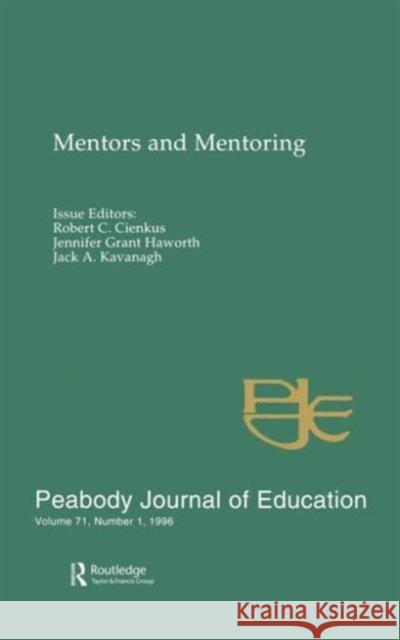Mentors and Mentoring: A Special Issue of the Peabody Journal of Education » książka
Mentors and Mentoring: A Special Issue of the Peabody Journal of Education
ISBN-13: 9780805899320 / Angielski / Twarda / 1996 / 130 str.
Mentors and Mentoring: A Special Issue of the Peabody Journal of Education
ISBN-13: 9780805899320 / Angielski / Twarda / 1996 / 130 str.
(netto: 666,90 VAT: 5%)
Najniższa cena z 30 dni: 654,86 zł
ok. 16-18 dni roboczych.
Darmowa dostawa!
The definition and parameters of teacher education have recently been changed by the concept of mentoring. Supporters of the concept maintain that it is an effective technique for inducting and retaining new teachers, but who and what are mentors, and what attributes do they possess?
Previous research has identified collaboration, enthusiasm, emotional commitment, and sensitivity as the necessary traits of an effective mentor. It has also been found that mentors are available, give immediate feedback, listen attentively, and collaboratively solve problems with mentees. Epistemological structures that best serve the mentor-novice relationship, gender issues between mentors and proteges, and moral development orientations within the mentor-intern relationship have also been investigated.
Thus, mentoring is a complex activity that involves a mentor, an intern or novice, and a process within a predetermined structure. The articles in this special issue validate the fact that the terms "good mentor" and "effective mentoring relationship" often elude easy definition. However, a common theme emerges: The mentor-mentee relationship is a transformative one that can change the course of one's life.
The definition and parameters of teacher education have recently been changed by the concept of mentoring. Supporters of the concept maintain that it is an effective technique for inducting and retaining new teachers, but who and what are mentors, and what attributes do they possess?
Previous research has identified collaboration, enthusiasm, emotional commitment, and sensitivity as the necessary traits of an effective mentor. It has also been found that mentors are available, give immediate feedback, listen attentively, and collaboratively solve problems with mentees. Epistemological structures that best serve the mentor-novice relationship, gender issues between mentors and protégés, and moral development orientations within the mentor-intern relationship have also been investigated.
Thus, mentoring is a complex activity that involves a mentor, an intern or novice, and a process within a predetermined structure. The articles in this special issue validate the fact that the terms "good mentor" and "effective mentoring relationship" often elude easy definition. However, a common theme emerges: The mentor-mentee relationship is a transformative one that can change the course of one's life.











